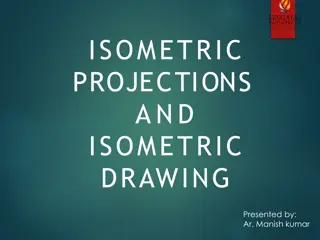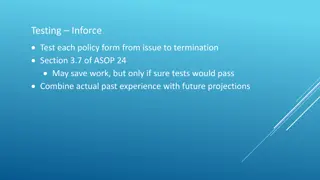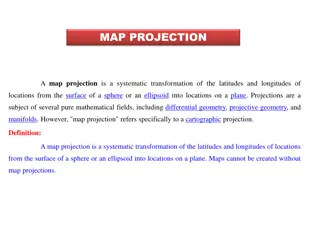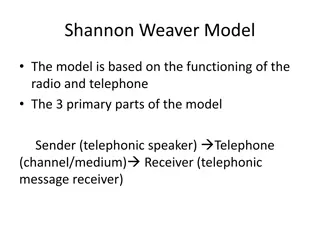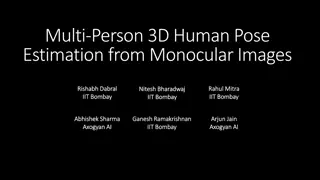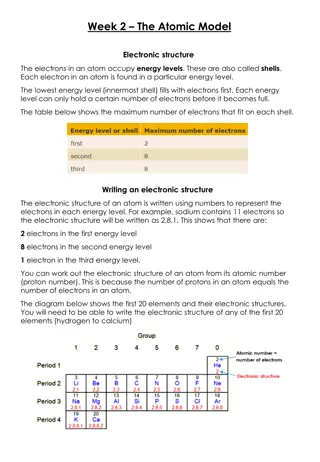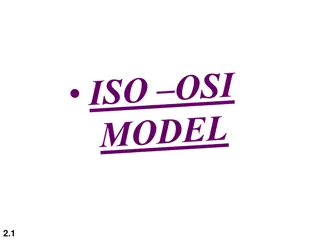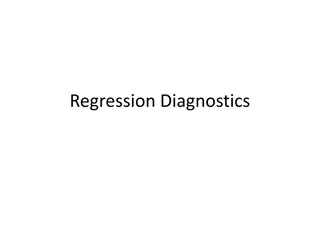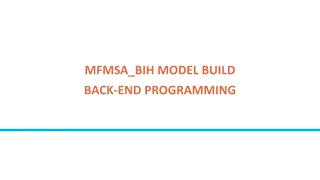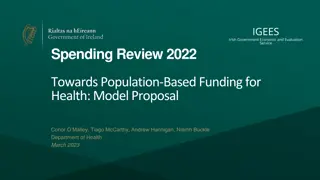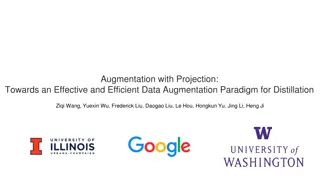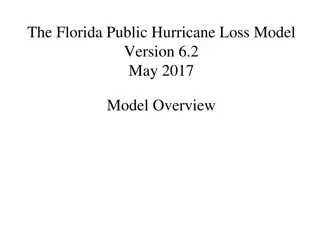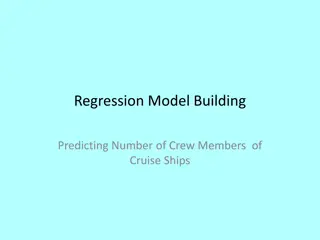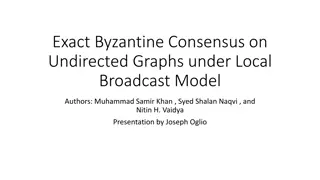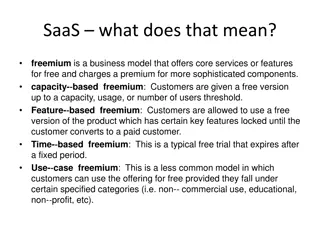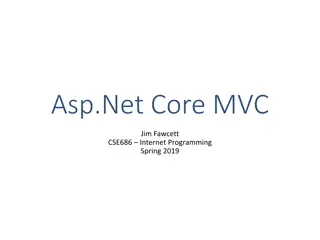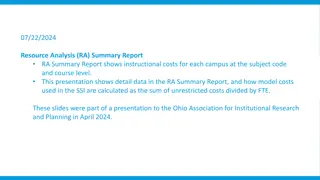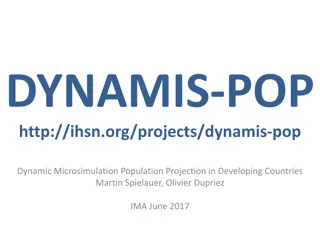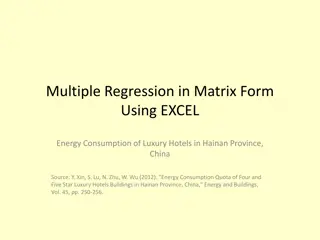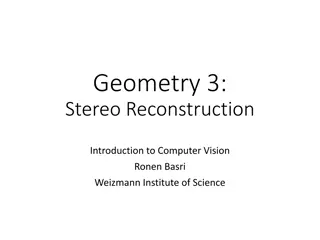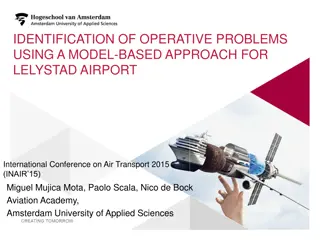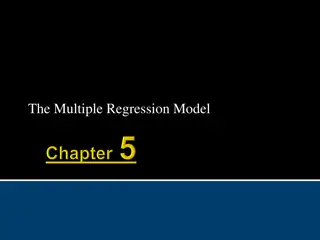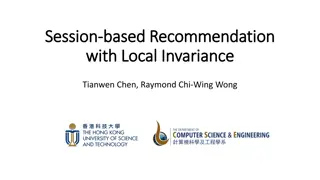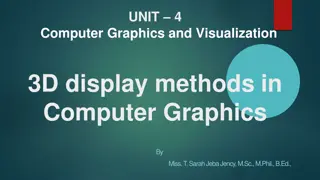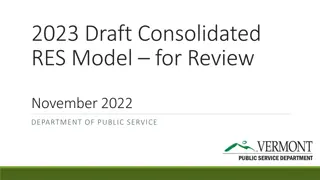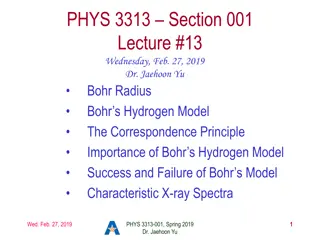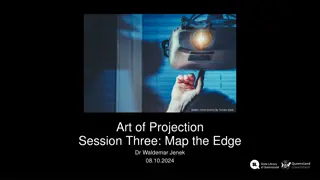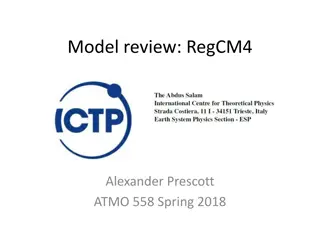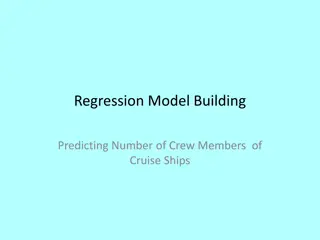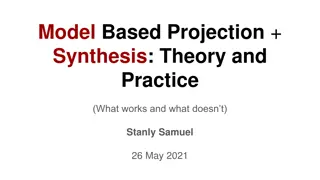Building a Macrostructural Standalone Model for North Macedonia: Model Overview and Features
This project focuses on building a macrostructural standalone model for the economy of North Macedonia. The model layout includes a system overview, theory, functional forms, and features of the MFMSA_MKD. It covers various aspects such as the National Income Account, Fiscal Account, External Accoun
2 views • 23 slides
NAMI Family Support Group Model Overview
This content provides an insightful introduction to the NAMI family support group model, emphasizing the importance of having a structured model to guide facilitators and participants in achieving successful support group interactions. It highlights the need for a model to prevent negative group dyn
6 views • 23 slides
Exploring Pinhole Projection with NASA PUNCH Outreach
Dive into the world of pinhole projection with NASA's PUNCH Outreach program. Discover the art of observing pinhole images of the Sun, explore hands-on experiments, and deepen your understanding of this fascinating imaging technique. Join Bhanu, the ray of light, on a playful learning adventure thro
3 views • 16 slides
Understanding Pinhole Projection of the Sun with NASA PUNCH Outreach
Delve into the fascinating world of pinhole projection with NASA's PUNCH Outreach program. Explore how round images of the Sun are seen through non-round holes, learn how to use the 3-Hole PUNCH Pinhole Projector, and gain insights into pinhole imaging both indoors and outdoors. Discover the playful
1 views • 21 slides
Understanding Isometric Projections and Drawings
Isometric projections provide a way to represent objects in three dimensions on a two-dimensional surface, making it easier for non-technical individuals to grasp complex shapes. This article discusses the differences between orthographic and pictorial views, principles of projection, types of proje
6 views • 10 slides
Actuarial Best Practices and Challenges in Policy Management
Explore the complexities of testing in-force policies, historical data analysis, projection methodologies, model governance, handling difficult situations, and enhancing actuarial models. Learn techniques to ensure data accuracy, manage policy performance, and address common industry challenges effe
0 views • 7 slides
Understanding Map Projections: Types and Applications
Map projection is a systematic transformation of latitudes and longitudes from a curved surface to a flat plane. There are various classifications based on construction methods, tangent surface position, view point of light, and qualities like equal area and equi-distance. Zenithal Polar Equidistanc
0 views • 9 slides
Understanding Entity-Relationship Model in Database Systems
This article explores the Entity-Relationship (ER) model in database systems, covering topics like database design, ER model components, entities, attributes, key attributes, composite attributes, and multivalued attributes. The ER model provides a high-level data model to define data elements and r
0 views • 25 slides
Communication Models Overview
The Shannon-Weaver Model is based on the functioning of radio and telephone, with key parts being sender, channel, and receiver. It involves steps like information source, transmitter, channel, receiver, and destination. The model faces technical, semantic, and effectiveness problems. The Linear Mod
0 views • 8 slides
3D Human Pose Estimation Using HG-RCNN and Weak-Perspective Projection
This project focuses on multi-person 3D human pose estimation from monocular images using advanced techniques like HG-RCNN for 2D heatmaps estimation and a shallow 3D pose module for lifting keypoints to 3D space. The approach leverages weak-perspective projection assumptions for global pose approxi
0 views • 8 slides
Understanding Atomic Structure: Electrons, Energy Levels, and Historical Models
The atomic model describes how electrons occupy energy levels or shells in an atom. These energy levels have specific capacities for electrons. The electronic structure of an atom is represented by numbers indicating electron distribution. Over time, scientists have developed atomic models based on
0 views • 5 slides
Understanding ROC Curves and Operating Points in Model Evaluation
In this informative content, Geoff Hulten discusses the significance of ROC curves and operating points in model evaluation. It emphasizes the importance of choosing the right model based on the costs of mistakes like in disease screening and spam filtering. The content explains how logistical regre
7 views • 11 slides
Understanding the OSI Model and Layered Tasks in Networking
The content highlights the OSI model and layered tasks in networking, explaining the functions of each layer in the OSI model such as Physical Layer, Data Link Layer, Network Layer, Transport Layer, Session Layer, Presentation Layer, and Application Layer. It also discusses the interaction between l
1 views • 41 slides
Regression Diagnostics for Model Evaluation
Regression diagnostics involve analyzing outlying observations, standardized residuals, model errors, and identifying influential cases to assess the quality of a regression model. This process helps in understanding the accuracy of the model predictions and identifying potential issues that may aff
1 views • 12 slides
Understanding Electroluminescence Time Projection Chamber (EL TPC) Physics
Delve into the fundamentals of Electroluminescence Time Projection Chambers (EL TPCs) through concepts like electron drift, scintillation mechanisms in noble gases, and charge yield estimation. Explore the workings of EL TPC prototypes, such as ZEPLIN II/III and DarkSide, for applications like react
0 views • 23 slides
Advancements in Pixel Readout R&D for Large Liquid Argon Time-Projection Chambers
Explore the latest developments in pixel readout research and development for large liquid argon time-projection chambers (LArTPCs) presented by Dan Dwyer at the CYGNUS Collaboration Meeting. Learn about signal characteristics, wire signal ambiguity, challenges in true 3D readout, and the innovative
0 views • 13 slides
MFMSA_BIH Model Build Process Overview
This detailed process outlines the steps involved in preparing, building, and debugging a back-end programming model known as MFMSA_BIH. It covers activities such as data preparation, model building, equation estimation, assumption making, model compilation, and front-end adjustment. The iterative p
0 views • 10 slides
Towards Population-Based Funding for Health: IGEES Spending Review 2022 Model Proposal
The Irish Government Economic and Evaluation Service (IGEES) presents a model proposal for implementing Population-Based Resource Allocation (PBRA) in the healthcare sector. The proposal aims to distribute funding equitably among Regional Health Authorities (RHAs) based on population needs and cost
0 views • 4 slides
Effective Data Augmentation with Projection for Distillation
Data augmentation plays a crucial role in knowledge distillation processes, enhancing model performance by generating diverse training data. Techniques such as token replacement, representation interpolation, and rich semantics are explored in the context of improving image classifier performance. T
0 views • 13 slides
Florida Public Hurricane Loss Model Overview
The Florida Public Hurricane Loss Model, developed by a team of experts at Florida International University, provides hurricane modeling services to insurance industry clients. Since its first activation in 2006, the model has seen several updated versions accepted by the Florida Commission on Hurri
0 views • 18 slides
Regression Model for Predicting Crew Size of Cruise Ships
A regression model was built to predict the number of crew members on cruise ships using potential predictor variables such as Age, Tonnage, Passenger Density, Cabins, and Length. The model showed high correlations among predictors, with Passengers and Cabins being particularly problematic. The full
0 views • 16 slides
Exact Byzantine Consensus on Undirected Graphs: Local Broadcast Model
This research focuses on achieving exact Byzantine consensus on undirected graphs under the local broadcast model, where communication is synchronous with known underlying graphs. The model reduces the power of Byzantine nodes and imposes connectivity requirements. The algorithm involves flooding va
0 views • 7 slides
Understanding Freemium Business Model in SaaS Industry
Freemium business model in the SaaS industry offers core services for free with the option to upgrade for advanced features. Various freemium models include capacity-based, feature-based, time-based, and use-case-based. Pros include extended developer base and early user feedback, while cons involve
0 views • 4 slides
Understanding Asp.Net Core MVC - Building Web Applications with Model-View-Controller Pattern
Asp.Net Core MVC is a framework for building web applications based on the Model-View-Controller pattern. The model manages application data and constraints, views present application state, and controllers handle requests and actions on the data model. Learn about the MVC structure, life cycle, mod
0 views • 22 slides
Resource Analysis Summary Report for Instructional Costs
This Resource Analysis Summary Report analyzes instructional costs for different campuses based on subject code and course level. It outlines how model costs used in the State Share of Instruction (SSI) are calculated by dividing the sum of unrestricted costs by Full-Time Equivalents (FTE). The repo
0 views • 9 slides
Dynamic Microsimulation Projection Tool for Developing Countries
The DYNAMIS project, funded by the World Bank, aims to demonstrate the feasibility of dynamic microsimulation for population projections in developing countries. This portable platform offers highly disaggregated population projections and serves as a core component for simulating social development
0 views • 24 slides
Multiple Regression Analysis of Energy Consumption in Luxury Hotels - Hainan Province, China
Conducting a multiple regression analysis on the energy consumption of luxury hotels in Hainan Province, China using matrix form in Excel. The dataset includes 19 luxury hotels with the dependent variable being energy consumption (1M kWh) and predictors such as area, age, and effective number of gue
0 views • 13 slides
Introduction to Stereo Reconstruction in Computer Vision
This material covers the fundamental concepts in stereo reconstruction, including the pinhole camera model, perspective projection, epipolar geometry, essential and fundamental matrices, camera calibration, homography, and projective geometry. It also discusses stereo vision and 3D reconstruction fr
0 views • 41 slides
Model-Based Analysis for Identifying Operative Problems at Lelystad Airport
This research study presented at the International Conference on Air Transport 2015 explores the identification of operative problems at Lelystad Airport using a model-based approach. The study aims to develop a model for assessing the future performance of the airport, addressing challenges, and ob
0 views • 27 slides
Understanding X-CAPM: An Extrapolative Capital Asset Pricing Model
This paper discusses the X-CAPM model proposed by Barberis et al., which addresses the challenges posed by investors with extrapolative expectations. The model analytically solves a heterogeneous agents consumption-based model, simulates it, and matches various moments. It explores how rational inve
0 views • 23 slides
Principles of Econometrics: Multiple Regression Model Overview
Explore the key concepts of the Multiple Regression Model, including model specification, parameter estimation, hypothesis testing, and goodness-of-fit measurements. Assumptions and properties of the model are discussed, highlighting the relationship between variables and the econometric model. Vari
1 views • 31 slides
Enhancing Session-Based Recommendation with Local Invariance Model
Introducing local invariance to Session-Based Recommendation (SBR), the proposed model considers both detailed ordering and high-level session ordering. By explicitly capturing local context information and global sequential patterns, the model outperforms existing methods in predicting the next use
0 views • 19 slides
3D Display Methods in Computer Graphics: Parallel vs Perspective Projection
3D computer graphics utilize a three-dimensional representation for rendering images. This article discusses parallel and perspective projection methods, highlighting their differences in preserving proportions and creating realistic views. Parallel projection maintains relative proportions, while p
0 views • 14 slides
Analysis of Vermont's Renewable Energy Standard and REC System
This document presents an overview of Vermont's Renewable Energy Standard (RES) and Renewable Energy Credits (RECs) system. It covers the establishment of the RES, specific requirements, eligibility criteria for RECs, and the different tiers of the RES. Key topics include the projection of impacts,
0 views • 23 slides
Understanding Bohr's Model of the Hydrogen Atom
Exploring the significance of Bohr's hydrogen model in physics, this lecture delves into the Bohr radius, the correspondence principle, and the success and limitations of his model. Discover how characteristic X-ray spectra contribute to our understanding of atomic structures, leading to the conclus
0 views • 14 slides
Exploring the Art of Projection Mapping in Modern Home Cinema Workshop
Delve into the captivating world of projection mapping through a workshop led by Dr. Waldemar Jenek. Explore the basics, software tools, and creative applications of this technology, transforming everyday objects into dynamic visual displays. Gain hands-on experience with Premiere Pro, TouchDesigner
0 views • 24 slides
Overview of RegCM4 Model Features
RegCM4 is a community model developed since the 1980s, with over 800 scientists contributing to its advancements. It features a fully compressible, rotating frame of reference and a limited area dynamical core based on the Penn State/NCAR Mesoscale Model 5 (MM5). The model uses hydrostatic and nonhy
0 views • 14 slides
Predicting Number of Crew Members on Cruise Ships Using Regression Model
This analysis involves building a regression model to predict the number of crew members on cruise ships. The dataset includes information on 158 cruise ships with potential predictor variables such as age, tonnage, passengers, length, cabins, and passenger density. The full model with 6 predictors
0 views • 15 slides
Projection Methods in Chemistry: A Survey of Linear and Nonlinear Techniques
Visualization and interpretation of high-dimensional data structures in chemistry can be achieved through projection techniques. Linear projection methods like PCA and Pursuit Projection allow for dimensionality reduction and clustering tendency exploration. The Intent Pursuit Projection (PP) techni
0 views • 26 slides
Understanding Model-Based Projection Synthesis Theory and Practice
Explore the theory and practical application of Model-Based Projection Synthesis (MBP) in solving problems related to quantifier elimination, validity of first-order logic fragments, and witness synthesis. Learn about solving existential quantifier sentences and extracting witnesses in the context o
0 views • 56 slides




